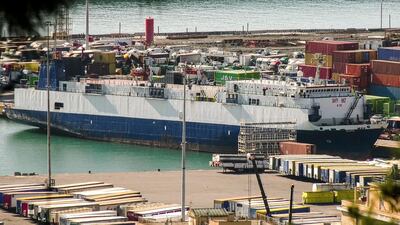France has denounced an "extremely aggressive" intervention by Turkish frigates against a French navy vessel taking part in a Nato arms embargo mission near Libya in the Mediterranean.
The French ship had wanted to check whether the Turkish vessel Cirkin was smuggling arms to Libya, which is forbidden under a UN embargo.
In response, French officials said the Cirkin switched off its tracking system, hid its ID number and refused to say where it was going.
Then Turkish frigates carried out radar targeting three times, suggesting a missile strike was imminent, the French Defence Ministry said.
"This is an extremely aggressive act that is unacceptable by an ally against a Nato ship," a ministry official said.
"We consider this an extremely grave matter. We cannot accept that an ally behaves this way, that it does this against a Nato ship, under Nato command, carrying out a Nato mission."
The French Defence Minister, Florence Parly, later brought the matter up during a video conference with her Nato peers, her office said.
But a senior Turkish military official said France’s accusation was "completely untrue".
The official told Reuters that the French warship did not establish communications with the Turkish ship during the incident.
"Turkey is fulfilling its obligations as an ally, today as always," he said. "It has saddened us that the matter has reached this stage."
Tensions between Nato members France and Turkey have flared recently over their roles in the civil war in Libya.
Turkey supports the UN-recognised government in Tripoli with Syrian militias, extensive weapons systems and vehicles as well as military trainers and advisers.
France is believed to favour the rival Libyan National Army under Field Marshal Khalifa Haftar.
Turkey's support for the offensive by the Government of National Accord runs directly against efforts to secure a ceasefire, a French Foreign Ministry spokesman said.
This week, Ankara condemned as unacceptable criticism from France over its shipments of weapons and fighters to the GNA, which Paris calls a "direct violation" of the UN embargo.
"These waves of boats between Turkey and Misurata, sometimes escorted by Turkish frigates, are not contributing to any de-escalation," the French ministry official said on Wednesday.
Turkish Foreign Minister Mevlut Cavusoglu on Wednesday paid a surprise visit to Tripoli.
Libya has been torn by years of violence, drawing in tribal militias, radical extremists and mercenaries since the 2011 toppling of longtime dictator Muammar Qaddafi.
While Turkey has the second-largest army in the Nato alliance, it has been increasingly obstinate in co-ordinating with the bloc.
Three allied diplomats and a French defence official said on Wednesday that Turkey was continuing to block Nato defence plans for Poland and Baltic states, despite a deal in London last year between Turkey's president and allied leaders.
Diplomats said that while Ankara has approved the plan, known as Eagle Defender, it has not allowed Nato military chiefs to put it into action.
"Turkey is refusing to accept these plans unless we recognise the PYD/PKK as a terrorist entity," they said, referring to Syrian and Turkish Kurdish groups that Ankara regards as dangerous rebels.
"We say 'no'. We need to show solidarity for eastern allies and it's not acceptable to block these plans."

